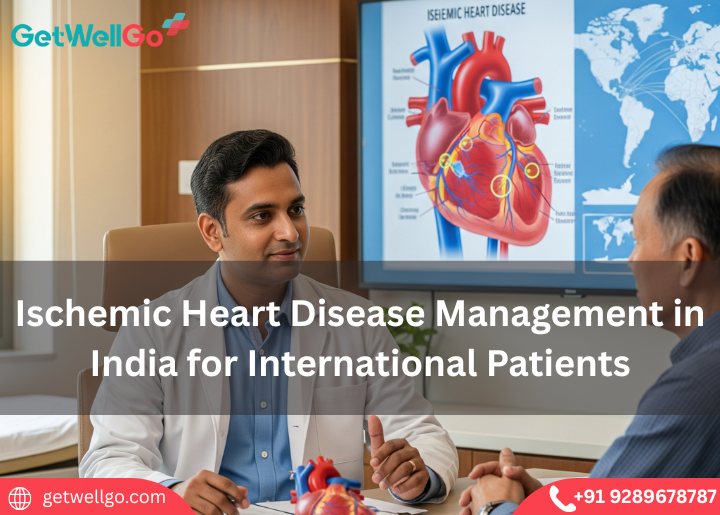
Plan Your Catheterisation Procedure in India – Step by Step Guide
Plan your catheterisation procedure in India with GetWellGo – a complete step-by-step guide for international patients seeking quality, affordable care.
Read MoreCardiac electrophysiology specialists examine and treat patients with problems in the heart's electrical system. They use a variety of techniques to diagnose heart.

Category
CardiologyPublished By
GetWellGo TeamUpdated on
14-May-2025A cardiac electrophysiologist is a cardiologist that specializes in the electrical system of heart and diagnosis and cure of heart rhythm complications, which are known as arrhythmias.
Some of the main functions of a cardiac electrophysiologist are as follows:
Cardiac electrophysiologist’s consultation is necessary when:
Dr. Sameer Mehrotra is a dynamic and highly skilled Interventional Cardiologist and Cardiac Electrophysiologist. Dr. Sameer has versatile experience in performing primary & elective angioplasties, electrophysiology (EP) & Ablation procedure like VT, AF, and Ablation. He is also a certified device specialist, performing PPI & CRT-D implantation.
Cardiac electrophysiologist of repute with expertise in all cases of RF ablations including complex ablations. Great experience in implantation and follow up of pacemaker and related devices (ICD, CRT etc.)
Dr. (Col) Manjinder Sandhu is a renowned interventional cardiologist with more than 35+ years’ experience. He specializes in complex angioplasty (IVUS, OCT, Rotablation, Laser) and structural heart (TAVR, MitraClip) procedures.
Dr Balbir Singh is Chairman of Cardiology Pan Max, he heads Cardiology and is responsible for development, quality, clinical governance, physician hiring, credentialing, research and training, including DNB program in Cardiology across all Max hospitals. He joined Max HealthCare in November 2019 after a long and successful tenure as Chairman of Interventional Cardiology and Electrophysiology at Medanta Hospital.
Dr Vanita Arora is known for her expertise in the field of cardiac pacing and electrophysiology including RF ablation of complex arrhythmias, ICD implantation, Biventricular Pacemakers, Leadless Pacemakers and His Bundle Pacing.She is currently working as Senior Consultant, Cardiac Electrophysiologist & Interventional Cardiologist at Apollo Hospital, New Delhi. She is pioneer in the country for 3D mapping for complex arrhythmias, Leadless Pacemaker, Cardiac Resynchronization therapy, His Bundle Pacing and Left Bundle Pacing.
Selection of the right heart rhythm specialist (cardiac electrophysiologist) is significant in making accurate diagnosis and successful treating of people suffering from arrhythmias. In this practical guide you will learn how to choose the one:
Electrophysiology heart treatment is termed as procedures and therapies that are used for the diagnosis and treatment of the arrhythmias (heart rhythm disorders). These procedures are conducted by specialists of the electrical system of the heart called cardiac electrophysiologists.
EP treatment aims at correcting abnormal electrical impulses of the heart which causes the heart to be beating too fast, too slow or irregularly.
Main Electrophysiology Treatments
Electrophysiology (EP) Study
Catheter Ablation
A minimally invasive operation for arrhythmias treatment.
The impaired electrical tissue is eliminated with:
Commonly used for:
Pacemaker Implantation
Implantable Cardioverter Defibrillator (ICD)
Cardiac Resynchronization Therapy (CRT)
Left Atrial Appendage Closure (LAAC)
In such AFib patients who are not able to take blood thinners, devices such as the Watchman can be used to prevent stroke that results from blockage at the location where the clot is formed in the heart.
Cardiac arrhythmia is one of the diseases of cardiovascular system in which heart beats irregularly (too fast, too slow or erratically). It depends on the type and severity of the arrhythmia, the causes of the arrhythmia, and your overall heart health.
Lifestyle & Risk Factor Management
Medications
Cardioversion
Catheter Ablation
A non-invasive operation that eliminates abnormal heart tissue responsible for resulting in the arrhythmia.
Highly effective for:
Pacemaker Implantation
Implantable Cardioverter Defibrillator (ICD)
Left Atrial Appendage Closure (LAAC)
An Electrophysiology (EP) test, also known as an EP study, is a non-intrusive testing device which is used for testing the heart’s electrical activity and the source of abnormal heartbeats (arrhythmias).
Purpose of the EP Test
It helps:
Preparation
Catheter Insertion
Thin, flexible wires, known as catheters are inserted into a vein (usually in the groin or neck) to the heart via X-ray imaging guiding.
Electrical Mapping
Diagnosis and Optional Treatment
They may as well do the catheter ablation to correct the abnormal rhythm found in case any is detected.

Plan your catheterisation procedure in India with GetWellGo – a complete step-by-step guide for international patients seeking quality, affordable care.
Read More
Explore cost-effective MRA imaging abroad with GetWellGo. Trusted by international patients for quality diagnostics, accessible care, and peace of mind.
Read More
ABPM test abroad made easy! Learn why India is the best choice with GetWellGo—trusted by international patients for quality care, top doctors & affordability.
Read More
GetWellGo connects international patients to leading hospitals in India for safe, advanced Balloon Valvuloplasty. Start your heart-healing journey today.
Read More
Access advanced aneurysm treatment in India with GetWellGo. Trusted care, global patient support, and leading specialists for safe, affordable treatment.
Read More
Explore affordable Acute Coronary Syndrome treatment options in India. Learn about top hospitals, expert cardiologists, and advanced therapies trusted by international patients.
Read More
Affordable ischemic heart disease management in India with GetWellGo. Advanced cardiology care & personalized support for international patients.
Read More.png)
GetWellGo connects global patients with safe, affordable blood clot treatment in India. World-class care, expert doctors, and cost savings await.
Read More
Pacemaker surgery in India with GetWellGo – expert care, affordable costs & top hospitals for global patients. Learn what you need to know now.
Read More
Coronary bypass surgery in India offers life-saving cardiac care for international patients with expert surgeons, advanced technology, and affordable treatment options.
Read More
Modern coronary angiography in India with GetWellGo—affordable, accurate, and trusted by patients worldwide for exceptional international heart treatment
Read More
Discover affordable pediatric cardiac surgery in India for international patients, with expert child heart surgeons, advanced technology, and top-rated hospitals for safe care.
Read MoreFill the form below to get in touch with our experts.
Please fill in your details below and our experts will get back to you.